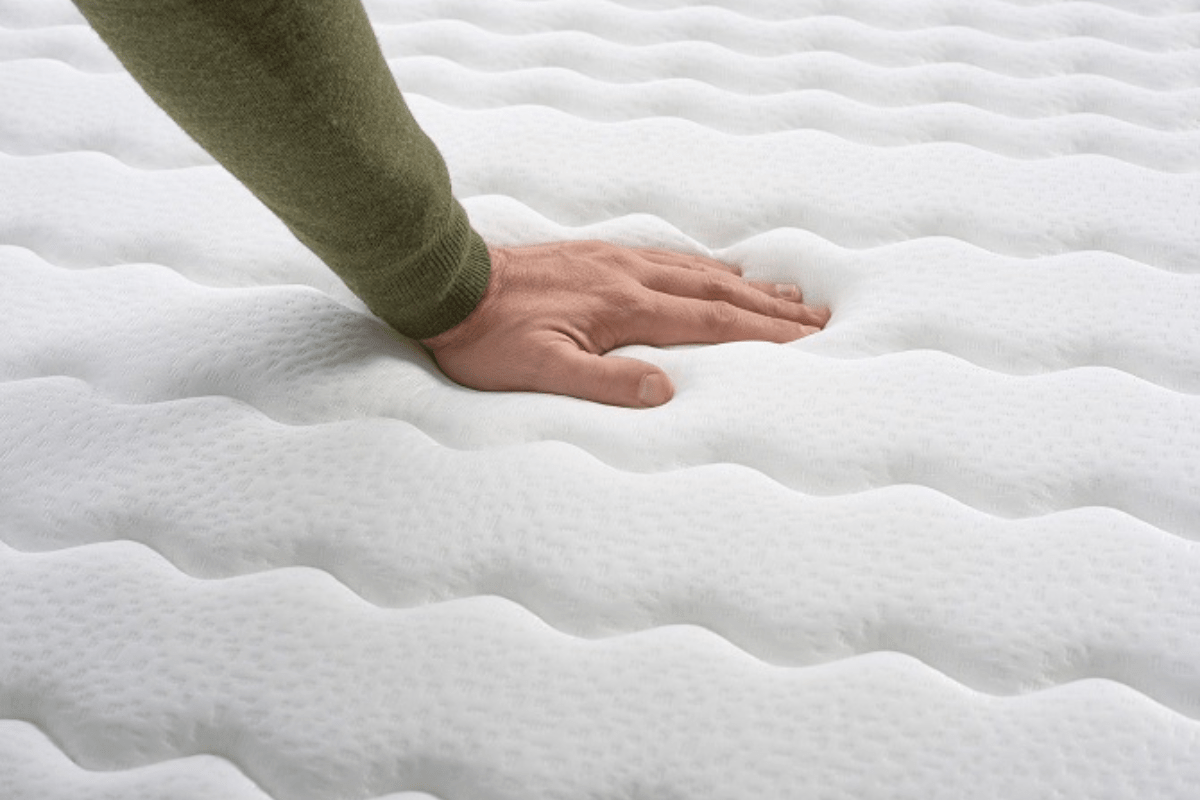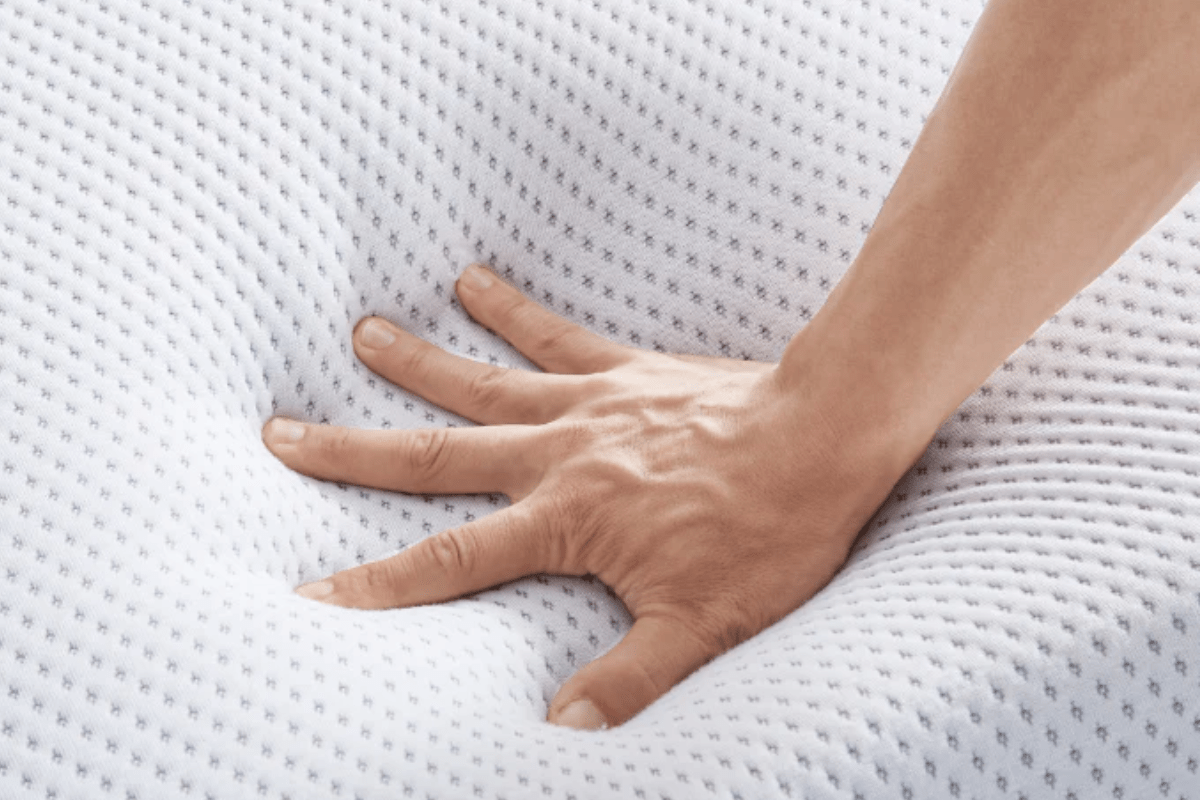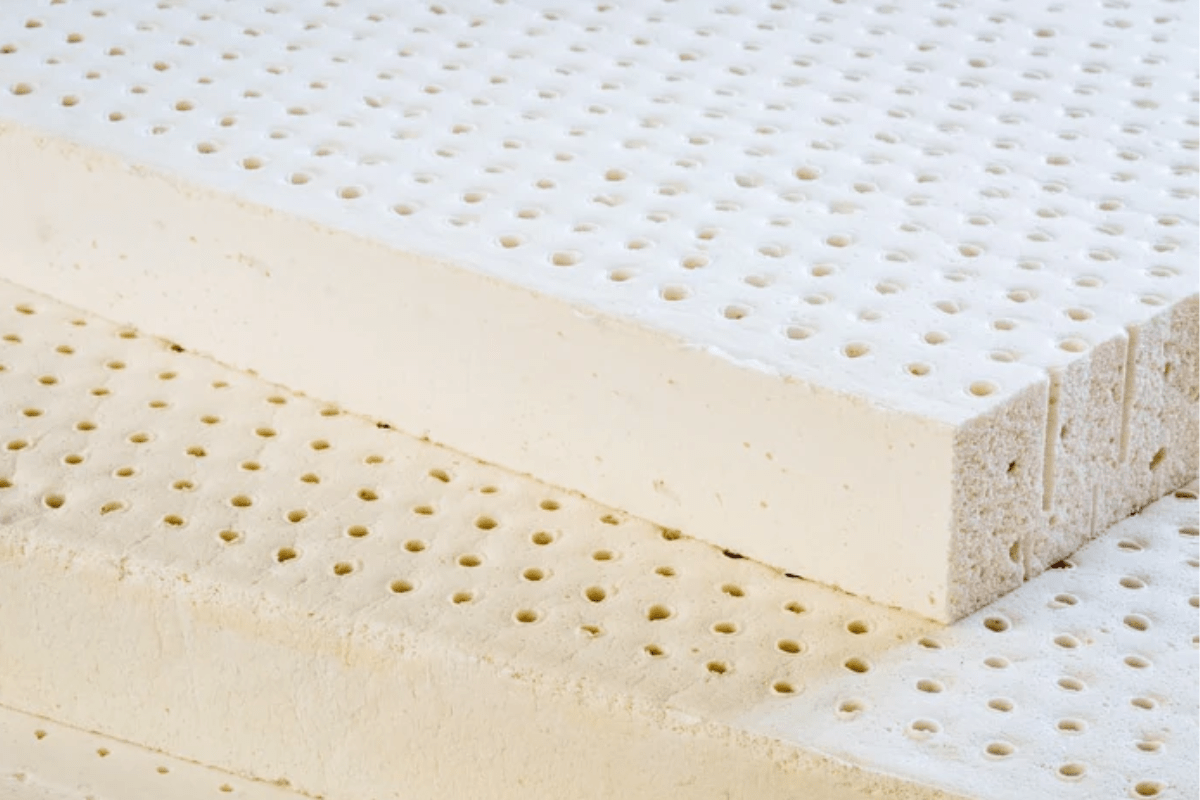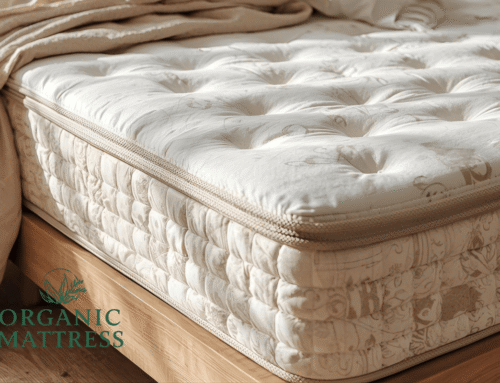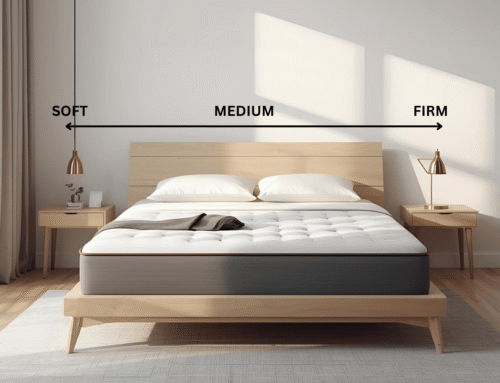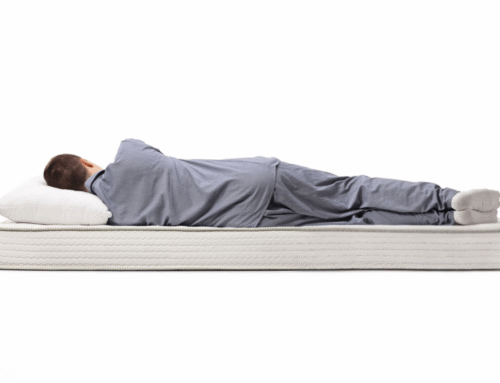Back pain can turn even the coziest bed into a nightly battle. That’s why choosing the right mattress firmness really matters. One of the most common questions people ask is: Is a medium soft or medium mattress better for back pain?
Here’s the truth: both options offer different benefits, and what’s best depends on your body type, sleep position, and pain level. This guide will help you figure it out. We’ll go over what medium soft and medium mattresses feel like, how they help your back, and which one may bring you the relief you need.
Key Takeaways
- Discover how mattress firmness level—from medium‑soft to medium‑firm—impacts spinal alignment and helps reduce back pain with balanced pressure relief.
- Medium‑soft mattresses cushion hips and shoulders, ideal for side sleepers and lighter individuals seeking gentle support.
- Medium‑firm mattresses offer a blend of support and comfort; they maintain spine neutrality and ease back and stomach sleeper aches.
- Your sleep position and body weight matter: lighter sleepers find soft feels comfy, while heavier folks benefit from firmer structures.
- Always test firmness—lie in your usual position and sense spinal alignment or pressure points. A risk‑free trial can help you find your match.
What Is a Medium Soft Mattress?
A medium soft mattress is the perfect middle ground for comfort seekers. It feels plush and inviting—like sinking into a cozy, gentle hug after a long day. You’ll notice more give than a typical medium mattress, which makes it incredibly relaxing. But a medium soft mattress is really known for its ability to relieve pressure, especially around the hips and shoulders.
That’s why it’s good for side sleepers, who often need extra cushioning in those areas. If you’re wondering, is it good overall? For the right sleeper, absolutely. It offers a soft, contouring feel that many find ideal for restful sleep. However, if you have back pain or need firmer support to keep your spine aligned, it might not be the best choice. Still, for anyone who values softness and sink-in comfort, it’s a dreamy option worth considering.
What Is a Medium Mattress?
A medium mattress strikes a great balance between soft comfort and solid support. It’s not too plush, not too firm—just the right mix to help you feel both cradled and supported while you sleep. This level of firmness gives you enough cushioning to ease pressure points without sacrificing the structure your body needs. That’s why it’s often the go-to choice for people with back pain.
It helps keep your spine aligned, which is key for waking up without aches and stiffness. A medium mattress is especially ideal for back sleepers who need consistent support, but it’s also great for combination sleepers—those who move between sleeping on their back, side, or stomach throughout the night. If you’re unsure what firmness to choose, medium is often the safest and most versatile option. It works well for many body types and sleeping styles, making it a popular, well-rounded pick.
Why Mattress Firmness Matters for Back Pain
When it comes to back pain, mattress firmness can make a huge difference. If your spine isn’t properly aligned during sleep, discomfort tends to build—often leaving you sore or stiff in the morning. A mattress that’s too soft might let your hips sink too deeply, throwing off your alignment. On the flip side, one that’s too firm can create pressure on your joints, especially around the shoulders and lower back.
That’s why understanding the difference between medium soft and firm mattress options is important. Medium soft offers more cushioning, while firm provides solid support—but which is better for back pain? For many, a medium or medium-firm mattress hits the sweet spot, helping muscles relax and supporting the spine’s natural curve. Choosing the right firmness not only promotes comfort but also helps reduce strain, allowing for deeper, more restful sleep and fewer painful mornings. It’s truly worth the extra thought.
Medium Soft vs. Medium: Pressure Relief
When it comes to pressure relief, the feel of your mattress really matters. A medium soft mattress offers extra cushioning, which can be a game-changer for side sleepers and people with a smaller body frame. If you weigh under 130 pounds, you won’t sink in too much, and the softer feel can help ease tension around the hips and shoulders.
That’s why it’s helpful to know who should sleep on a medium soft mattress—mainly lighter individuals and those who prefer a gentle, contouring surface. On the other hand, if you sleep on your back or stomach, or if you’re on the heavier side, a medium firm and medium soft mattress may feel quite different. In these cases, a medium option usually works better, offering more support to keep your spine in line while still cushioning pressure points. Choosing the right firmness helps you sleep more comfortably and wake up refreshed.
Medium Soft vs. Medium: Support
Support is one of the most important things to look for in a mattress because it’s what keeps your spine aligned and your body properly cushioned through the night. A medium mattress typically offers stronger, more consistent support, which is especially helpful for people dealing with lower back pain. If you’re wondering how soft a medium soft mattress is, think of it as gently plush—it gives you a nice sink-in feel without being overly squishy.
While that can feel incredibly cozy, medium soft mattresses might not provide enough support over time for larger body types or stomach sleepers. That’s why many people ask, is it better to sleep on a medium soft or firm mattress? The answer depends on your sleep position and body weight. If you need more structure and alignment, medium or even firm might be best. But for comfort and pressure relief, medium soft can still be a dreamy option.
Sleep Position Matters
- Back sleepers usually do best with a medium mattress.
- Side sleepers often prefer medium soft for better pressure relief on hips and shoulders.
- Stomach sleepers need something closer to medium or even firmer, to keep their hips from dipping too low.
Your sleep position plays a big role in how your mattress affects your back pain. That’s why it’s important to match firmness to how you sleep.
Body Weight and Mattress Feel
Your body weight plays a big role in how a mattress feels. If you weigh under 130 pounds, you won’t sink into the mattress as much, so even a medium mattress might feel firmer than expected. In that case, a medium soft mattress could be just right—it offers a cushier feel that gently contours to your body without being too plush. On the other hand, if you’re over 200 pounds, a medium soft mattress might not give you the support you need.
It could feel overly soft, leading to poor spinal alignment and potentially more back pain. That’s why medium firmness tends to be a safer choice for heavier individuals—it provides better support, helps distribute your weight more evenly, and is less likely to sag over time. Choosing the right firmness based on your weight can make a huge difference in your comfort and the quality of your sleep.
Mattress Materials Make a Difference
The materials inside your mattress can make a big difference in how it feels and how long it lasts. A medium mattress made with latex or high-density foam tends to offer solid support and better durability, which means it can maintain its shape and feel for years. These materials help keep your spine aligned and reduce the risk of waking up with aches and pains.
On the other hand, medium soft mattresses made with lower-density foams might feel great at first but can wear out faster. Over time, they may start to sag or lose their support, which can actually make back pain worse. That’s why it’s important to pay attention to what’s inside the mattress—not just how it feels on the surface. No matter what firmness you choose, look for a bed with high-quality support layers. A well-made mattress is a long-term investment in your comfort and sleep health.
What Doctors and Experts Say
When it comes to back pain, doctors and sleep experts tend to agree on one thing: a medium-firm mattress is usually the best choice. It provides the right balance of comfort and support to help keep your spine in a healthy, natural position throughout the night. That said, a medium soft mattress isn’t necessarily a bad option—it can still be a great fit for lighter individuals or side sleepers who need extra pressure relief. But if you struggle with chronic back pain, medium or medium-firm is generally a safer bet.
Even the American Chiropractic Association recommends these firmness levels for people dealing with ongoing back issues. The goal is to prevent your body from sinking too much while still feeling cushioned and relaxed. Ultimately, the best mattress is the one that supports your unique body and sleep style—but expert advice can definitely help guide your decision toward better rest.
Final Verdict: Don’t Sleep On This Decision
Your mattress can make or break your mornings, especially if you’re dealing with back pain. If you’re constantly waking up sore or stiff, it might be time to rethink what you’re sleeping on. Choosing the right firmness isn’t just a comfort thing, it’s a smart move for your health. For many people, a medium mattress hits the sweet spot: firm enough to support your spine, but soft enough to feel cozy and inviting.
If you’re on the lighter side or prefer sleeping on your side, a medium soft mattress might actually feel more comfortable and give you the pressure relief you need. The real key is matching your mattress to your body and the way you sleep. Everyone’s different, and now that you’ve got the facts, you’re better equipped to make the right call. A restful, pain-free night’s sleep could be just one mattress decision away—don’t sleep on it.


